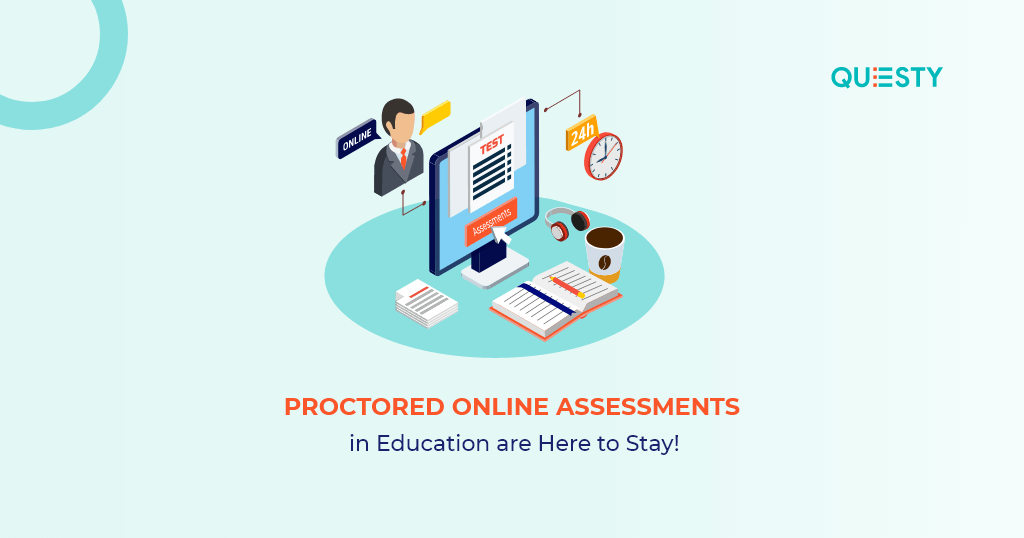Covid-19 has changed our lifestyle, the way we work, and even the way we learn. All Schools, Colleges, and Universities have temporarily closed down to contain the spread of the deadly virus.
As per UNESCO estimates as of 8th April 2020, the closure of educational institutions in 188 countries across the world impacted over 154 crore students.
The pandemic has already delayed many examinations, as it is too risky to conduct them traditionally. Also, with this prolonged situation, it is becoming difficult to predict when regular academic sessions will make a comeback. Several educational institutions have already adopted online assessments, and many others are following suit.
At the same time, there is a different school of thought that resists the adoption of online tools, citing that it would widen the gap between students who have access to all the internet-related tools and those who do not. There is a huge dilemma revolving around the right way forward.
The history of humanity witnessed changes in the educational systems many times when some systems became obsolete, and others emerged to replace them. The disruption that this pandemic has brought to the education sector is real, and everyone will have to adapt to it sooner or later.
A recently conducted private study has based its findings on the practices which countries across the world are adopting. It suggested that higher education institutes might replace traditional exams with online assessment tools shortly. Also, they might leverage online proctoring services to enable their students to take exams from home.
Connect with us to know how Questy’s best in class cheat-proof online assessments can help your educational institution.
What is an Online Assessment?
Online Assessment, also called digital assessment or computer-based assessment, is a systematic process that helps examiners establish measurable and clear learning outcomes of students. The students can take online tests from their devices or the PC lab in the educational institution.
Did you know that the adoption of e-marking for conducting tests dates back to the year 2000 when the University of Cambridge Local Examinations Syndicate used it?
Yes, the book titled Educational Techniques and Methodology, written by Sage Mckinney, talks about it.
Digital Assessments include different types of assessments, such as summative, diagnostic, or formative, and many question types, including multiple-choice, drag & drop, gap fills, etc.
Advantages of Online Assessments
Online assessments save a lot of time for the staff of educational institutions. Besides, they provide many benefits:
Eliminate geographical barriers
Institutions offering distance education have their students staggered over a wide demographic. Online assessments help them determine the learning outcomes of their students using digital on-screen techniques.
Also, as COVID-19 has locked all students in their homes, only computer-based assessments can rescue educational institutions seeking to examine.
Adoption of digital assessments by reputed universities like the University of Oxford has helped their staff to easily slide into the work from home mode without affecting the quality of their services and has benefitted their students as well.
Highly flexible and accessible
Students benefit by appearing for exams from the comfort of their homes, save commute time and expenses, and avoid stress.
Online assessments provide flexibility to the administration staff as it allows them to use advanced tools for the creation of assessment questions while maintaining the high-quality standards of the educational institution.
Ease of administration
Offline pen-paper tests involve printing, circulating, and security activities in addition to the creation of exam questions. Internet-based Assessments eliminate such activities.
Also, the members of the examining body can easily collaborate online for question authoring-related matters. They can design clear workflows for review and approval of questions before adding them to the question bank with the help of online assessment tools.
Automated marking
Online assessment tools streamline marking and moderation of exam results. They standardize the processes while maintaining a high level of security. They are capable of providing immediate results for auto-scorable questions.
Even though subjective questions require the examiner’s involvement, they find it quick and convenient to mark questions online. Assessment tools eliminate human-errors in the calculation of marks.
Save costs
Traditional examinations involve several expenses. These include rent for exam premises, electricity bills, fees for human invigilators and other supporting staff, courier charges for question paper and answer sheets, security charges for storing the exam papers, fees for checking of answer sheets, and much more. Whereas with computer-based assessments, educational institutions can save on such costs.
Eliminate cheating
Academic dishonesty is a critical reason preventing some educational institutions from adopting the digital assessment route. However, the advancement in technology over the past few years has eliminated this doubt.
Advanced online and remote proctoring, also called remote invigilation, ensures to maintain the integrity and high quality of assessments. Educational institutes get cheat-proof assessments with proctoring.
What is Online and Remote Proctoring?
Proctoring or invigilation of exams is a pretty old practice that helps to keep a check on cheating. As we replace traditional tests with online assessments, it is essential to have digital proctors.
Proctored Online Assessments ensure that a digital eye watches people taking the exam. The proctoring software monitors the examinee’s computer, webcam video, and audio to detect anomalies in behavior. Proctored Assessment platform Questy also raises red flags when it detects any deviation from the normal behavior of the student.
Online Proctoring allows the invigilator to monitor the student online at the time of the test. In Remote Proctoring, the examinee reviews the recording of the test at a later time and date as per convenience.
Questy also provides an image proctoring feature that captures images of the student at regular intervals for the examinee to monitor the behavior.
Advantages of Online and Remote Proctoring
Online and Remote Proctoring enhances the benefits of internet-based assessments that we have discussed earlier. Let’s look into the additional advantages, which proctoring provides:
Convenience for students
Students perform better by appearing for the exam with their regular computer. Also, proctored online assessments give freedom from the tiresome pen-paper tests.
Besides, online exams allow the use of computer-based tools, thereby eliminating the need for writing lengthy exams.
Scaling benefits for educational institutions
Online and remote proctoring allows educational institutions to arrange more exams at varying times rather than concentrating on important exam days. It also facilitates them to serve more students worldwide without worrying about geographical diversity.
Increased security to retain the integrity of exams
Secured assessments are essential both to the educational institutions as well as honest students who study hard to score high in them. Proctored computer-based assessments make it difficult for students to cheat as a digital eye is continually scanning them and recording any infringements.
Advanced assessment tool Questy provides additional features to ensure that the digital assessment cannot be hacked, and the examinee cannot change tabs during the test.
The Takeaway
The pandemic seems to have provided the push for a significant digital transformation in the education industry. It’s time to take a more reflective approach to online assessment and online learning.
Face-to-face education and assessment cannot go entirely online within a space of a few weeks, and that too, as suddenly as COVID-19 has forced it to do. At the same time, it is not the right time to undermine Digital Assessments just because some institutes or groups of students are not able to benefit from it due to the lack of technical infrastructure.
A recent study by a London-based organization suggests that schools and colleges are likely to invest more in permanent technical infrastructure post-COVID-19.
If you wish to know how Questy can help your educational institution with online assessments and learning, connect with us






